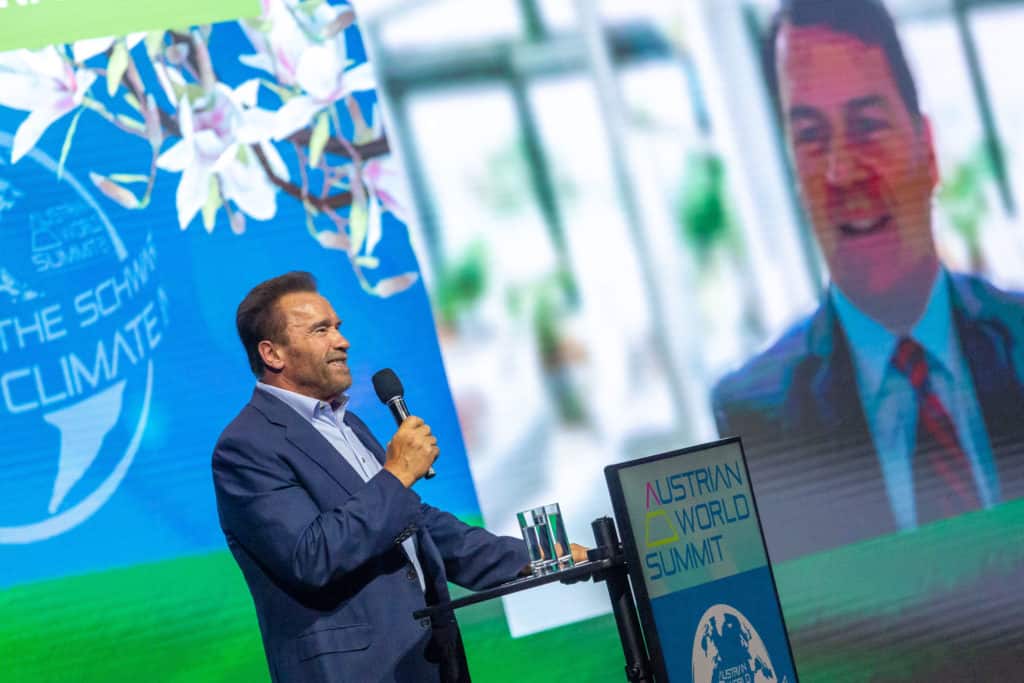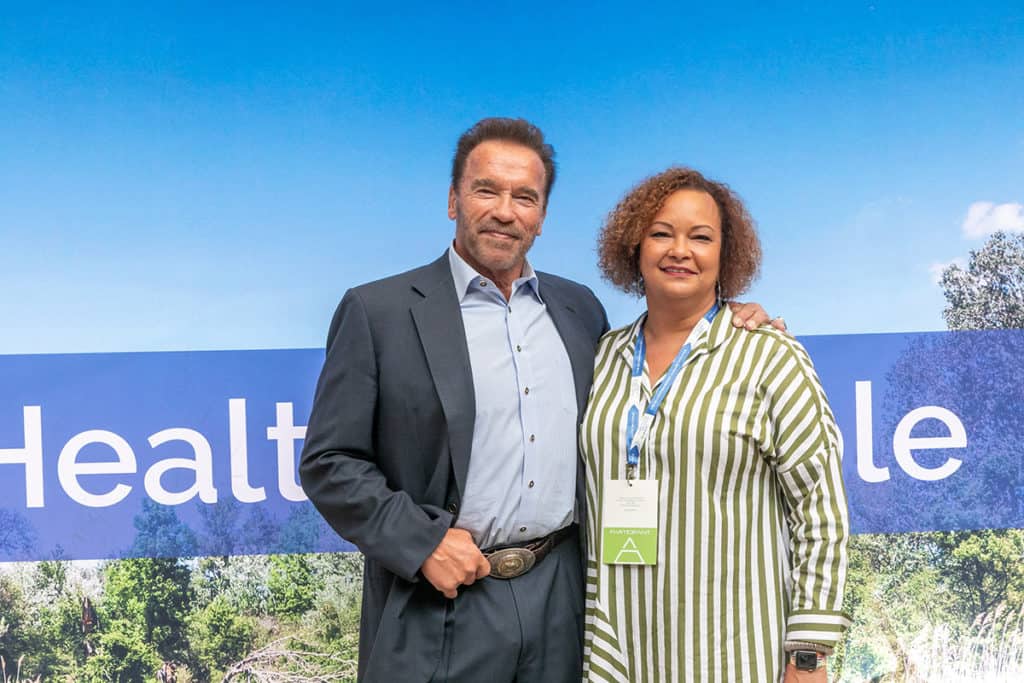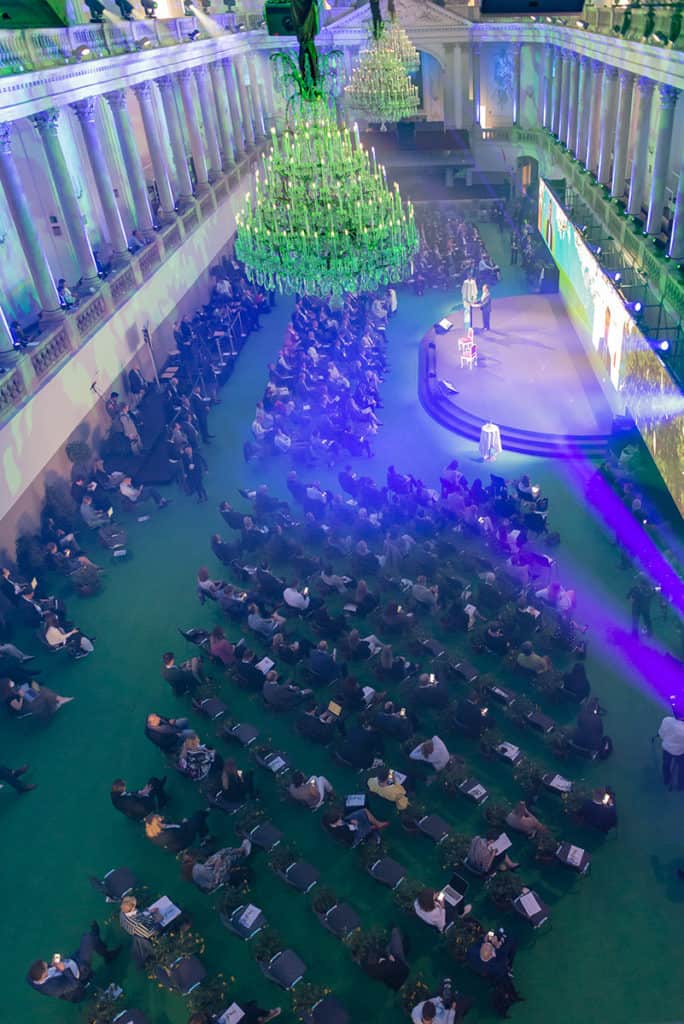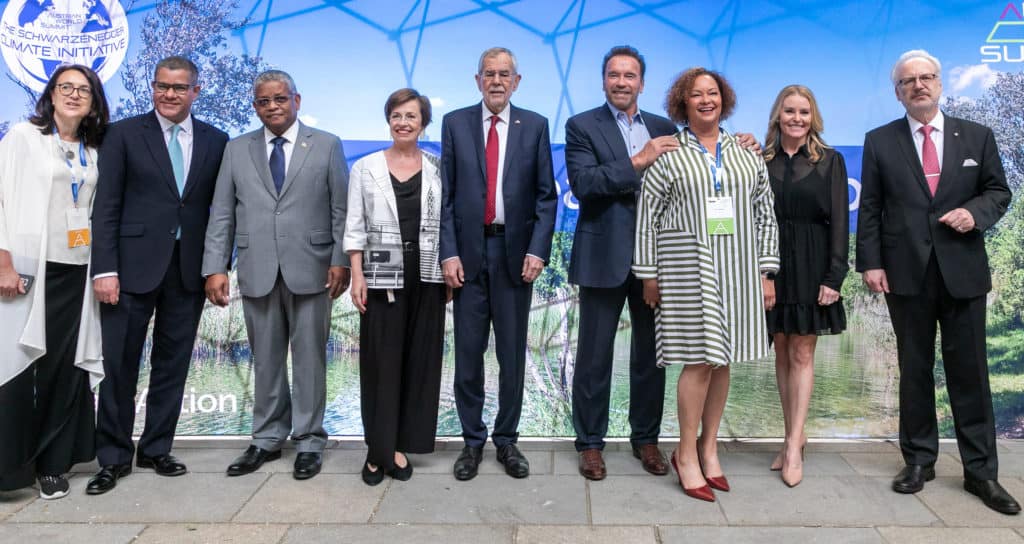By: Eric Ruble

Former Gov. Arnold Schwarzenegger doesn’t view the climate crisis as an insurmountable challenge, but rather an opportunity for the private and public sectors to collaborate for the common good. This principle is at the heart of the fifth annual Austrian World Summit, which Schwarzenegger has hosted with Austrian President Alexander Van der Bellen and Austrian Chancellor Sebastian Kurz in Vienna since 2017.
On July 1, politicians, activists and business leaders gathered to go beyond discussing the problems facing the planet, and focus on solutions being implemented to help industry and government achieve monumental goals.
The summit emphasizes our individual and collective power to combat climate change; a vision that closely aligns with USC’s new sustainability plan and reflects the Price School’s mission to improve the lives of people and communities worldwide. Schwarzenegger, chairman of the USC Schwarzenegger Institute at the Price School of Public Policy, emphasized that if people are reminded too often of the scale of the obstacles ahead, they will be discouraged from acting.

“I know that we can’t relax – we must move forward very aggressively. But people need encouragement, not just dread and despair,” he said.
The former California governor pointed to a number of accomplishments that instill hope: 50 major corporations pledging to be carbon neutral by 2040, 100,000 pre-orders for Ford’s new all-electric pickup truck and three new directors on Exxon Mobil’s board pushing the company to reduce its greenhouse emissions.
“The thinking is changing all over the world, and we should be talking about that. There have been huge victories in the private sector and the public sector,” Schwarzenegger said.
The impressive list of guest speakers included German Chancellor Angela Merkel, activist Greta Thunberg, Secretary John Kerry, COP26 President Alok Sharma, Ford Motor Company CEO Jim Farley and Apple’s vice president of environment, policy and social initiatives, Lisa Jackson.
Prominent speakers expressed urgency
In her video message, Merkel touted Germany’s efforts to be carbon neutral by 2045, which include retrofitting buildings to be more efficient, phasing out coal and accelerating renewable energy programs.

“The window of time in which we can still prevent the most damaging effects of climate change is closing,” Merkel said.
She emphasized the importance of tackling the issue from a global perspective.
“The natural resources upon which we all depend are at stake. If we care about preserving them, we must become climate neutral as quickly as possible,” Merkel said.
In a live video address, Thunberg did not mince words. She said while many have voiced concerns for the environment, few politicians have taken demonstrable steps to achieve change and are instead “pretending to take responsibility.”
“The gap between your actions and words is becoming more impossible to ignore,” Thunberg said. “Nature and physics are not entertained nor distracted by your theater.”
She said that net-zero goals are admirable in theory, but in practice, they are filled with gaps and loopholes. She specifically criticized high-income nations – like those at the G7 Summit – for what she believes is too little investment in clean energy.
Schwarzenegger also chided the G7 leaders, saying “nothing of substance” was achieved at their June event.
As Thunberg said, “We will not be able to solve a crisis we do not treat as a crisis.”
Collaborative discussions highlighted the work ahead
The Austrian World Summit included a number of discussions that touched on how the world’s biggest companies can influence change throughout the private sector. Schwarzenegger led one conversation with Jackson, who was the administrator of the Environmental Protection Agency before joining Apple in 2013.

Jackson said she believes companies can prosper without sacrificing the planet’s health.
“Yes, our products are important. But we also have to do [business] in a way that doesn’t sacrifice our children’s future, that doesn’t sacrifice prosperity as well,” Jackson said.
She said Apple is already carbon neutral and plans to make all of its suppliers carbon neutral by 2030.
“We have a roadmap for our environmental product that is as serious in the company as our roadmap for the next iPhone,” she said.
When addressing the crowd, Schwarzenegger referred to the “Terminator” films in which he starred, saying the movies displayed the power of hope and humanity’s collective willpower. While politicians may create policy changes, the former governor argued nothing will happen without public support.
“We need the people to be part of our environmental crusade,” he said. “We need the people to put the pressure on our elected leaders to change the status quo and to achieve sweeping change.”
The Summit sent a clear message: halting climate change is the great challenge of our time. And while it will require enormous innovation and collaboration, humans have overcome massive hurdles before, and can do so again.
Explore more of the Summit’s discussions and speakers by visiting the event website.